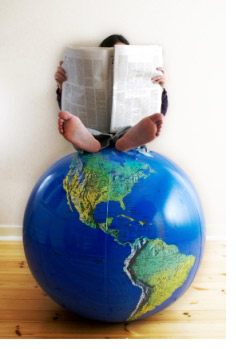 Or is it the farther I go?
Or is it the farther I go?
Further/farther is one of the more confusing pairs of words, stumping even the toughest writers and editors. There are a few issues at play here. First, both are comparatives of a single word, far. Second, each one seems to have developed to cover a specific context, a specific type of far-ness. Third, there are US-UK differences (of course!). And fourth?the biggie?you can really use either you want, with a caveat.
Physical vs. Figurative
Traditionally, farther has been used to refer to physical distance:
Traditional Example A: If you drive three kilometres farther up the road, you’ll see an old farmhouse.
In contrast, further has long been preferred for figurative distance:
Traditional Example B: The disagreement over whether to accept the relocation package drove us further apart.
In UK English, the definitions are expanded: while farther is still limited to physical distance, further can cover both physical and figurative distance.
The Caveat
Note my word choice here: “preferred” and “traditionally.” The further/farther debate is a great example of organic language change in action.
Interestingly, Garner’s Modern American Usage?a goldmine of information on historical and current usage?lists the opposite, or traditionally incorrect usages as “Stage 4,” which essentially means their use is “virtually universal but . . . opposed . . . by a few linguistic stalwarts.”
In other words, saying “I’ve walked five miles, and that’s further than I’ve ever walked before” is traditionally less-preferred usage in the US, but few will notice?and even fewer will care.
So which form should you use, and when? Given the state of language change, it is probably okay to choose whichever you prefer?unless your writing is super-formal and/or your audience is extremely picky.
The key is to be consistent within a written work. Because the goal is an easy, fluid reading experience, it’s less important whether your preference is farther or further to describe physical distance, and more important that you follow this convention every time the usage comes up. Ditto with further vs. farther for figurative distance; again, you’ll want to aim for consistency.
For example, in a written work you might have the following:
Example C: The fight drove us farther apart.
Example D: I retreated farther into my cocoon.
Example E: The jog was much farther than I’d expected.
But in the same written work you’d want to change Example F, since it might feel inconsistent:
Example F: The more time passed, the further away it all seemed.
More consistent Example F: The more time passed, the farther away it all seemed.
If you don’t like the consistent version, consider changing the other instances of further/farther for figurative distance?again, the key is consistency across the writing.
What other word pairs or grammatical/usage concepts stump you? What are your pet peeves? Email The Voice and we’ll try to cover them in a future column!
Christina M. Frey is a book editor, literary coach, and lover of great writing. For more tips and techniques for your toolbox, follow her on Twitter (@turntopage2) or visit her blog.

